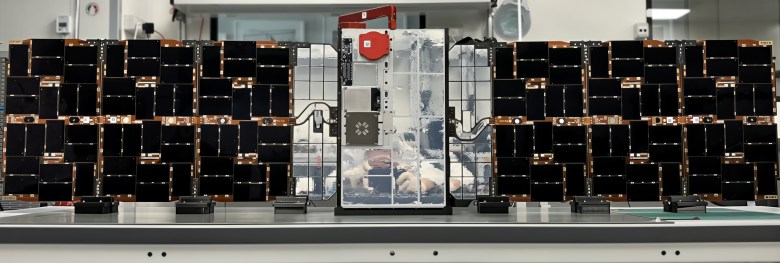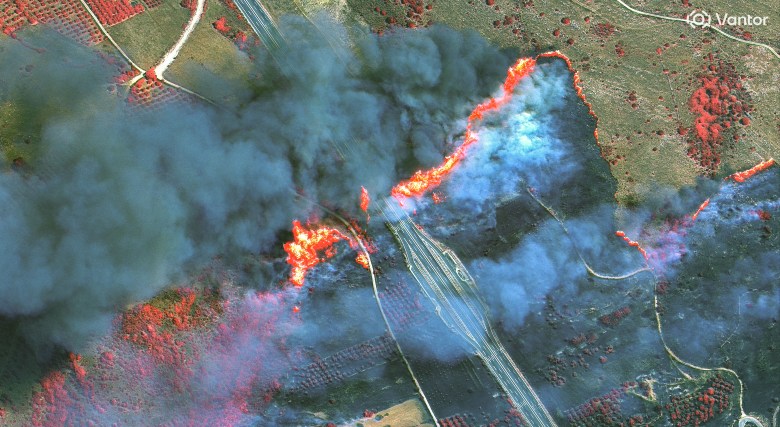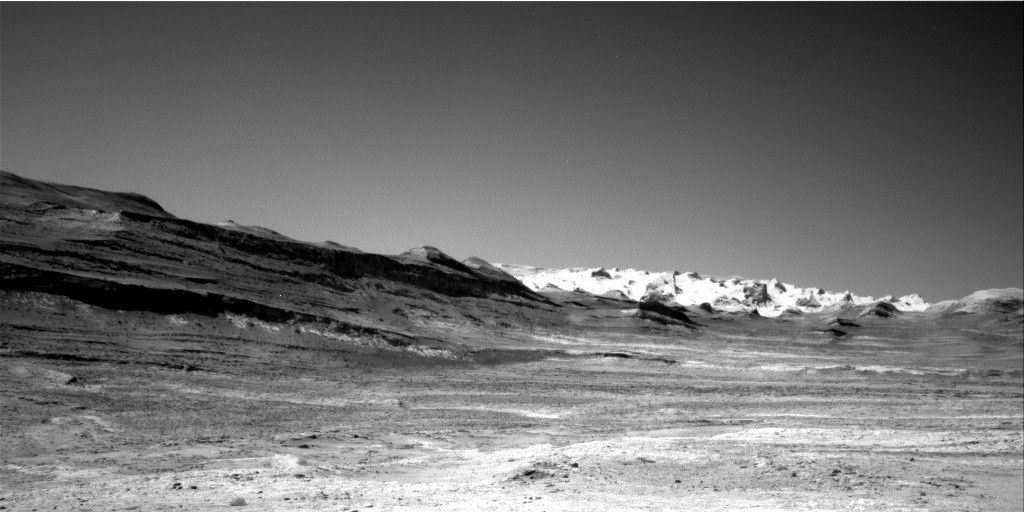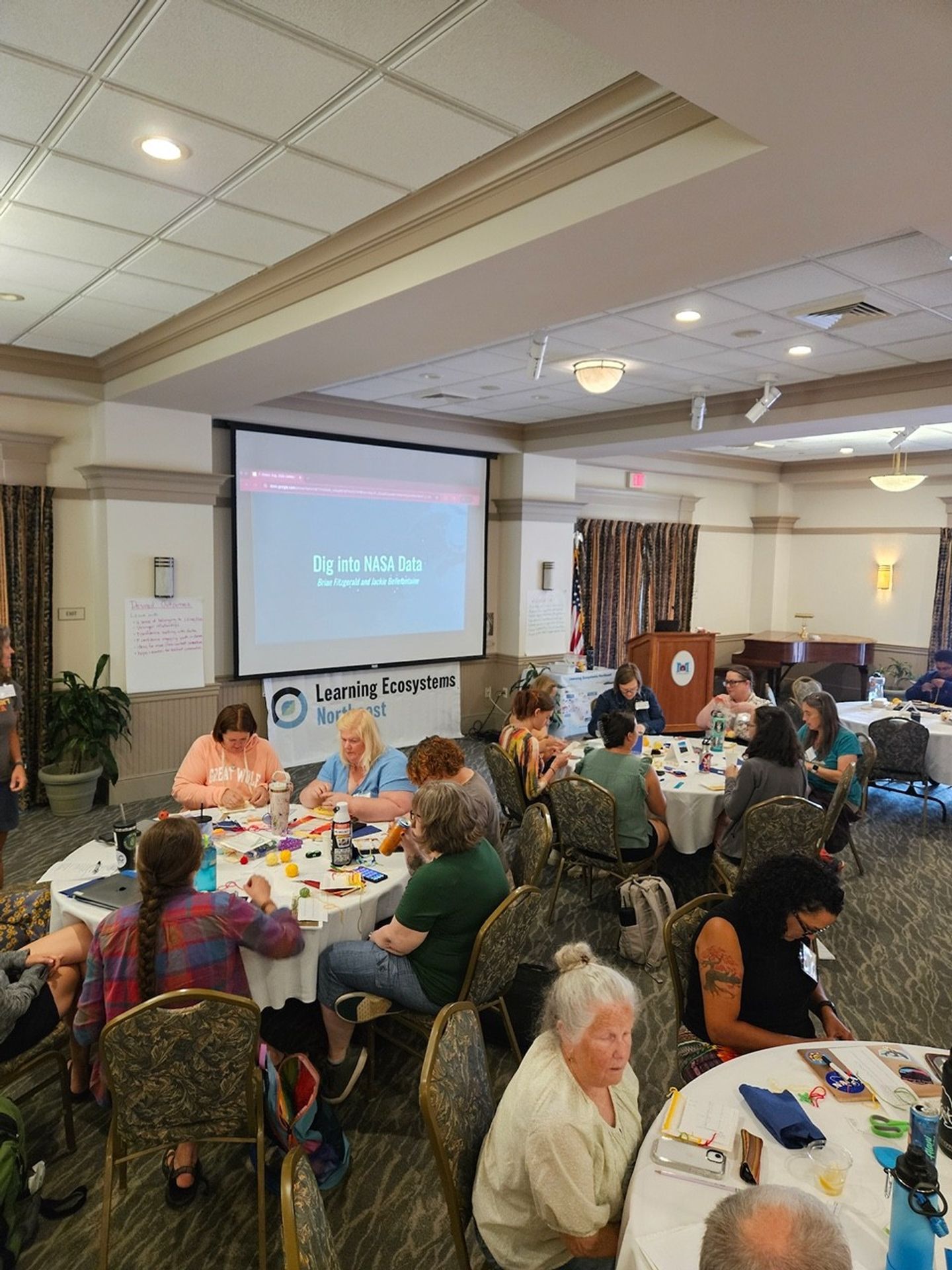Now Reading: Inside ESA’s vision with Josef Aschbacher
-
01
Inside ESA’s vision with Josef Aschbacher
Inside ESA’s vision with Josef Aschbacher
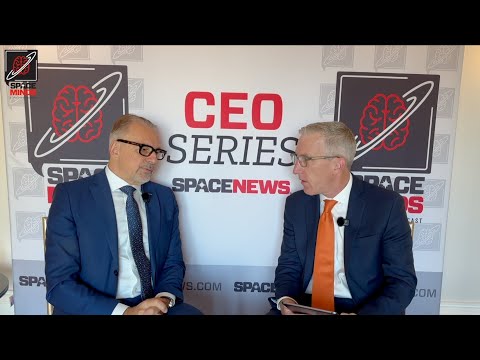
In this week’s special CEO Series edition of Space Minds, we’re at the World Space Business Week in Paris. In today’s episode, SpaceNews editor Mike Gruss talks with Josef Aschbacher, Director General of the European Space Agency.
They discuss Europe’s case for greater investment in space, the growing role of defense and security in ESA’s agenda, and the ambitious budget negotiations ahead of November’s ministerial conference. From dual-use technologies to new launch competition and commercial partnerships, Aschbacher outlines how ESA is positioning itself for a rapidly changing space economy.
sponsored by
Show notes and transcript
Click here for Notes and Transcript
Time Markers
00:00 – Episode introduction
00:53 – Welcome
01:17 – How is ESA making its case?
04:36 – Defense and dual use
09:01 – Budget and priorities
12:10 – European Resilience from Space program
14:35 – Launcher competition
19:17 – Partnerships
24:07 – Commercial collaboration
Transcript – Josef Aschbacher Conversation
Mike Gruss – Hello and welcome to the Space Minds podcast in partnership with Blacksky. I’m Mike Gruss from SpaceNews, and we’re here in Paris at the World Space Business Week. We have a series of CEOs and leaders we’re going to be talking to this week, and I’m excited to get this kicked off with Josef Aschbacher from the European Space Agency. Thanks so much for joining us. I want to start with a question about how you are making your case right now, not just here in Paris or not just this week, but what do you say to Europe’s leaders about the need to invest in space? Why now? And what’s what can be gained and what can be lost? Because this is a big part of the ESA 2040, plan, exploring and discovering and but also inspiration. So. So how do you how do you inspire countries leaders?
Josef Aschbacher – Well, as you say, like space is inspiring, and certainly has a lot of inspirational, you know, moments and milestones to offer. But we are having a ministerial conference this year in November in Bremen, in Germany. And there, as you say, I really have to talk a lot to decision makers, sometimes heads of government, heads of state, or the ministers in charge of space, to really explain the case. And I boil it down to simple arguments. And I think that there are two strands that are really convincing, at least for most of them. One is space is very interesting economic sector. It grows by about 10% per year. We have a space economy of about 500 billion, 600 billion US, dollars today, or Euros. And this grows to 1.8 trillion, which is the figure very often quoted. So if you just extrapolate these figures, it’s about nine to 10% per year of the global space economy. So there’s not many sectors of the economy with such a growth.
There’s probably AI or similar ones. But if you take health, transport, energy, they are not going as fast as space. So space is, purely from an economic perspective, extremely interesting and extremely convincing as an argument. Plus, if you invest one euro in space, we estimated about five to seven euros come back into the economy through new services, taxes and new businesses that are being developed. So there’s the economic argument, and some countries or some leaders are more attuned to economic arguments, and some others a bit less. The other argument that has really come extremely strong just recently is geopolitics. Space is a tool of geopolitics. We see it extremely clearly in the United States, but also in China and Russia and other countries, and also in Europe, if I say geopolitics, it also means linking it much better, much tighter to defense and security.
And this is quite a new development in Europe, but this has not been at all happening as strong as today and since a couple of months, really, we have a very different debate on how space can be useful for countries to build up strength, to build up strength in also in defense, to couple Defense and Space much better. We have a commissioner in parcels in charge of space and defense, Mr. Kubilius, with him, we are working extremely well and very closely and together with my member states. I’ve 23 member states in European Space Agency. We are really having a very strong debate there, actually, to the point where member states have asked me to come with very concrete proposals on how to utilize our space assets much more, also for security and defense.
Mike Gruss – So how do you close that gap, and how do you go from an area where maybe space is seen as completely hands off from the military. It does not have defense purposes to hey, maybe there will be some sort of dual use technologies, or this there. There can be some overlap in how we’re thinking about some of these capabilities.
Josef Aschbacher – I mean, space has always been and there will always be a dual use technology. That means, if you invest in space, it certainly has a civilian usage, under military usage. I take a very simple example, or a very obvious one, which is meteorology, we are building meteorological satellites, either geostationary or polar orbiting. And there’s one type of satellite we are building, of course, in a network with global partners like us, like Japan and others, to exchange data, but it’s one type of data. There’s not a military meteorological satellite and a civilian one. It’s one type of satellite, and then the data streams go civilian and defense for the Air Force and for the farmer or for the tourist or whoever needs a weather forecast. So that’s a very good example. Uh, that shows that space technology actually is by nature, dual use. But what you mentioned, and this is really a change also in Europe, in terms of argumentation and developing the the case is that in the past, and also we as European Space Agency, we’ve been mostly focusing on science, civilian application, civilian programs, if I may, call them that way. We are quite good in Earth observation.
We are with a navigation program called Galileo, which is extremely good, a very accurate signal, actually the world’s most accurate signal right now in terms of positioning and timing. And we are very good also in space science, that means to explore the universe, sometimes together with NASA, sometimes through our own mission. So there we are, I would say, at world standard, and really having a capacity that is extremely well respected and well recognized. But on the defense side, some more defense related programs. We are really catching up. We have done some statistics globally of the space budget, even if the space budget is too in use. But if you would divide it into funding sources from defense or civilian sources, it’s about 50% defense funding and 15% civilian funding, except in Europe, where the share is only 15% one, five, not five, zero. So you see that in Europe the Defense Ministry, so the Defense Secretaries or ministers of defense are allocating a much lower share to space and for example, in the in the US or in other countries.
And that’s something that is being recognized and expected to change, and is expected to change very fast, especially now with the defense budgets being increased everywhere, also in Europe, with new NATO targets, and many ministers or ministries of defense are really recognizing now the need to link space and Defense much tighter, and which is obvious, I think, for somebody in us, it’s probably very obvious. But in Europe, this has been not so obvious for many years, and this is now happening. And also the debate that we have in the European Space Agency with my member states today is a very different debate compared to half a year ago or one year ago, defense was almost a nonverter a year ago to date, sir, very obviously, also part of our programs that we develop and we build up, of course, always driven by our member states policy making and funding at the end, but certainly a change that has happened very, very fast and very significantly.
Mike Gruss – And so I would imagine that also means a close relationship for you with some of these the militaries, or some of the space components of some of the European military, so that there these, these capabilities can overlap.
Josef Aschbacher – Yeah, it’s clear. I mean, if you are working to develop capabilities for the defense or security actors, then you need to talk to them, otherwise you don’t understand their needs. Of course, the needs are formally expressed either by European Commission, through Kobi news office, that means the commissioner for space and defense, or through our member states. But you’re absolutely right. We are getting much more interactions compared especially what we had in the past.
Mike Gruss – Let’s talk about the upcoming meeting in Berman. The number, I think that’s been talked about is maybe 22 $23 billion or budget for three year period. Where is there room for ambition in that budget, and where are there some risks? And where, what kind of conversations are you having right now, with some pushback from members, and where they say, Hey, I’d like to see more here. I’d like to see more of that. What, where does that conversation stand right now?
Josef Aschbacher – I mean, overall, and we’ve prepared this budget proposal for more than a year now, a year and a half, and it’s a very intense negotiation that we’re leading with all our member states we can imagine, you know, Greece or Germany or France or Finland, they have very different requirements in terms of what are their priorities nationally and what they want want to see in the working context of European states agency, but it’s quite a complex process to walk through.
And of course, we my job, or my team’s job, is to find an equilibrium that we have a proposal that is attractive for Greece as much as for France or Germany or any other country, and this is something that we are working on. So that means we have a number of programs that we are preparing. A priority is always with observation. We have always been very strong in that, not only through Copernicus, but also very strong Earth Observation Program, but also navigation, telecommunications, especially secure communication, and also satellite based internet signals or communication, is a priority that exploration is something that keeps increasing, quite significantly.
We have of course, a very strong cooperation with NASA, but also our own programs on low earth orbit, moon Mars and beyond. And launchers. We have a very strong launcher program with Ariane 6 now back on the launch pad, we can see the medium sized launcher also on the launch pad and successfully launching. So now we have to ramp up. This is certainly something that we’re doing, plus having a new family of launchers that we call the European launcher challenge, which is a completely new set of smaller launches. They will be starting as a smaller launcher, but they want all to go up to become a heavy launcher, and this is really a paradigm shift that we are going through, which we have decided just a year and a half ago through the European member states. So there’s a lot of of those activities, plus a new element that comes now on top, which is more defense related. There’s a program called ERS, European Resilience from Space, which is a, I would call it a surveillance and intelligence program, where we aim at building up very high resolution constellation of radar, optical infrared sensors with intelligence on board, with edge computing on board, interlinked through satellite communication. So really, having building up a system, actually a system of systems, and this is certainly in the making. So then we are really on day one of building up this program, but certainly something that is quite exciting.
Mike Gruss – And it will be a low Earth orbit constellation, how many satellites or range?
Josef Aschbacher – It’s not yet defined, but it will be a low Earth orbit constellation…
Mike Gruss – …But so it’ll be a proliferated constellation.
Josef Aschbacher – Absolutely.
Mike Gruss – Probably dozens or hundreds.
Josef Aschbacher – Certainly large numbers, because what we want to achieve is very high observation frequency every day, every 30 minutes, roughly every 30 minutes as a target, maybe depends on the need and the locations. But yes, absolutely, but not only with optical but a mixture of optical, radar, infrared, in order to really have a holistic view of any place in the world.
Mike Gruss – And so what’s the next step of that program?
Josef Aschbacher – So the next step is we are defining it right now. We are discussing it with our member states. I’m putting a proposal on the table for funding in November, and then we have to see how strong the funding is. Is coming because there’s one thing that will determine the architecture. Exactly will determine the architect. But the architecture is, we’re discussing it a lot on how it works, but maybe a step back to just say a word on it. The architecture has to be what we call a system of systems, in terms of technologies, so Earth observation, navigation and telecommunications, integrated together with maybe other technical elements, but also a system of systems in terms of participation, because we have some countries in Europe with a pretty strong, would say, list of satellites and assets already existing. So they want, of course, to keep full control of those assets, but they are willing to share, or they may be willing to share some of their capacity with other countries.
So we need to build up a system of systems that allows this to happen. And in addition, we need to augment the constellation with more elements in order to increase observation frequency and probably add new technologies on top. So yes, this is the system architecture we’re working with right now. It’s complex, as you can imagine, because very high security constraints are attached to it, and it will be complex, but we have shown at ESA that we are capable of creating developing complex systems. Copernicus is one example which is also quite complex, mix of and you had a role in that, and I had a role in that, exactly, this was actually my job for many decades, literally, so to build up a program like Copernicus, and we can do it. But of course, we are in this ERS program really, at the very beginning.
Mike Gruss – You mentioned the launcher competition as well. What’s the latest there? Well, not all 12 will go to not all 12 will be presented in November. Do you have a number?
Josef Aschbacher – Yyes, we have a number. Actually already boiled it down to five. Okay, 12 to five. We had a call just recently, which we evaluated before summer. So we are now down to five. And even from of those five, not all of them will make it to become a heavy long shot. This is intended, and this is obviously the natural selection process, but what we are doing now, so we are looking for funding for those five. We will act as ESA more, as an anchor tenant, so we let them develop whatever technology they feel most appropriate with whatever partner they think is most appropriate, but we will buy long services, and we will support some of the infrastructure development.
So it’s a new way of doing it. It’s not like we did in the past, where we developed the rocket from beginning to end with our industry, but in this case, it’s really letting industry completely drive it, a bit like what happens in the US, obviously, very successfully. And so we’re doing. Be applying the same model. Of course, we are. We need to accelerate. We need to be fast in order to really build it up. So what are the next steps? Yes, in November, there’s a very important milestone of funding. We do it together with European Commission, which will come with its funding from 2028 onwards. Again, something where the commission is extremely keen in stabilizing and making sure that we have guaranteed access to space. But eventually, out of these five, we think that it boils down to maybe two, and then we see whether we have two candidates that could run to be to provide a heavy launcher in the 30s as a result of this exercise, whether then it’s two or not. This number is still being debated. But this is certainly a target that we have, because for us, it is important to have competition, and therefore competition, we learn from us very well. It’s good to get good value for money.
Mike Gruss – Let’s talk about that. Because I think there have been a lot of questions or a lot of comments about this idea of sovereign autonomy, particularly in Europe. And launch, I think has maybe been the biggest part of that. You know, how do you? How do you, how’s your thinking about this topic changed in the last year, I think is really what my question is. But specifically, how do you match price or cadence? And maybe you’re saying, Hey, we’re not gonna be able to launch, price or cadence that maybe we see from some SpaceX or some other companies. But how are you thinking about this idea of seven autonomous when it comes to launch?
Josef Aschbacher – I mean, this is something that we discuss a lot, as you can imagine. It’s, of course, a very topical domain. So what is our thinking? And this is, what is something we have established now with our, I would say, collective thinking. So I firmly believe that that we need in the future, a competitive ecosystem. That means having two companies or two launcher providers, at least in order to buy from those launcher providers services and where we act as an anchor customers, as just mentioned. So number one, we need guaranteed access to space. So that means we do need our rockets in order to launch what we have to launch our European rocket, a European rocket, or a rocket that is under call it European control, with the European footprint in terms of legal entity and industrial ecosystem.
So yes, this is absolutely needed, because launches are strategic. If you do not manage to get your satellites into space, you are depending on other forces. So it is something that certainly we need to build up. And we’re not the only ones. Think of Japan, think of India, think of many others. Obviously, in addition, the United States that access to space is strategic and it’s a must. There’s no question. So we will guarantee that we have it today with Ariane 6 and Vega C, but as I say, we will convert eventually to a competitive launch from industry. But again, the need to have quite a European footprint is a very important argument in this selection process, which will, of course, be happening over the next coming years. So yes, guaranteed access to space is strategic, and we need to have a source. That doesn’t mean that we are not working with others. We have launched with others, as you know, including SpaceX, but also with India, with Japan in the past, we also having others launching with us. So we have Amazon, for example, who has bought 18 launches of Ariane 6 six. Again, it shows that once you have your guaranteed your guaranteed assets, then, of course, you’re willing to share and to offer to others. And this is exactly what we’re doing.
Mike Gruss – How about how about partnerships? Just international partnerships. And now that’s something that will probably come up several times this week. How are you thinking differently about Europe’s role in space, thinking about sovereign autonomy and partnerships? You know, some obviously, the particular coming from the US. There are some questions about the US NASA budget, and which programs you know, in cooperation with the ESA will work. But how are you thinking about partnerships differently, and how is it, how has that changed in the last 12 months or so?
Josef Aschbacher – That’s, that’s a big word, partnerships under partnerships always work if they are equal, fair, and they’re both benefiting from it. And this is, has always been the, would say, the driving force for ESA we’re actually known as probably the agency with most international partnerships. We’re working with basically everyone in the space domain. We have more than 300 agreements with different partners across the world. Of course, many with the US with NASA, but also other…
Mike Gruss – …risk.
Josef Aschbacher – Yeah, but let me put it this way. First of all, the cooperation with NASA has always been strong and extremely powerful, and I think, really fruitful for both sides. So I’ve been you mentioned it before. I’ve been working on Copernicus for many decades. We also have a very strong power. Partnership with us on that the US is participating in one of the central ambitions and benefiting from it just as as we do from the US contribution. Of course, the more visible part of our cooperation is in exploration. Within the exploration domain, exploration in Europe is much smaller than in the US.
My exploration budget in ESA is about eight to 10% of the annual budget in the US. It’s around 50% at least in NASA. So our share is much smaller. And I would say within this 10% let’s call it 10% of my budget on exploration, about 5% so about half of it is in cooperation with NASA. 5% is purely European. So overall, by budget, of course, the impact of decisions in the US is about 5% of the ESA budget. But still, it’s extremely important because it’s very strategic. It deals with low earth orbit, access to the space station and beyond it is Moon and Mars, where we have corporations. I have to say that E sir and I will make, I will do everything to deliver on our promises that we have agreed. When these are signed agreements, or signed means the US NASA has signed. But of course, with the approval of the Department of State, on my side, if my side, if I sign an agreement with us or with NASA or my predecessors. It is an agreement that is agreed by all 23 member states, and therefore it’s a very strong government to government agreement that we have in place, although it’s implemented through the agencies of NASA and ESA.
So to start with, I’m obliged, or I feel committed, to deliver what I have promised to deliver, and we have put our industrial work in place to do exactly that, that we deliver what we promise. Should something change as we have, as we are seeing it right now, in the budget negotiations, or could change which are still ongoing, so therefore, I do not want to comment on something that is not yet decided, but should it change? Then yes, of course, we will have to deal with it. And this is something that is a discussion I look forward to. I mean, I’m hopefully going to see very soon, also the NASA, Acting Administrator, with Secretary, not yet, not yet, but I understand he’s coming to the IAC in Sydney, which is a big event, and there are meetings planned now to see him there, and certainly we will need to see how this all plays out and works together. And I don’t want to preempt any of these discussions that will be coming, but it’s crystal clear that cooperation always has to be beneficial for both parties, and this is something that is, of course, extremely important on the other side, I really want to say that the cooperation we have with NASA is very valuable. Is very much appreciated by all my member states, from all the way from Germany, France, Italy to smaller member states. So that’s something on which we rely. We have a decade long member states, we have even made history together. And some of these activities, we provide the European Service Module for avion which allows NASA or the US to bring astronauts to the moon and eventually to the surface of the moon. And so we are an essential partner. That what I get as feedback so far is that this cooperation and our contribution is fully appreciated.
Mike Gruss – Great. One more quick question, which is obviously this, we’re here for World satellite business week. There will be a lot of commercial businesses here. I know that’s been a drive for ESA to work more closely with those companies. What? What do you expect to hear from the leaders you’re speaking with, and where, where do you see there that there is room for greater cooperation? Or what they’ll say is, hey, we, we can take on some of the work that makes it happen.
Josef Aschbacher – Oh, that’s, as you say, the world based business week. So it’s, it’s really about business. That’s something that I’ve already declared four years ago when I became director general of ESA, as a priority for ESA, that we want to really increase drastically our commercialization aspects. That means rely on commercial companies wherever we can. It’s happening in the US. It’s happening in Japan. It’s happening in other countries as well. And that’s certainly a drive that I’ve pushed forward, I would say very strongly, in the last two and a half years, we have signed more than 70 agreements with venture capital companies and big banks funding institutions to invest, also private money in space in Europe. And this is a very powerful, a very successful we call it ESA investors network. It’s a very powerful network where space companies on one side are brought together with investors.
And it’s not only me getting them to meet, but there’s technology developments needed, understanding on both sides required, and it really is very, very helpful. Last year, for example, about 1.5 billion. Euros company, billion dollars have been invested of private money into the space economy in Europe. And this is increasing a lot. It’s 50% more than the year before, and it keeps increasing. So I’m really building this up. So I’m working more and more with commercial companies, but also with US companies. Of course, Europe as European Space Agency is my my target, but we also have commercial corporations with us, companies who then team up with other European companies. And that’s also part of our job to facilitate this and make this work. And this is certainly a huge drive that I see, and personally, I’m very committed to that,
Mike Gruss – Josef, thanks. Thank you so much for joining us. This was a good conversation. We’re looking forward to seeing what happens in November, as I know you are again, I’d like to thank our sponsor, Blacksky. Thank you so much for watching, all of our coverage from WSBW will be available on SpaceNews.com thanks again.
About Space Minds
Space Minds is a new audio and video podcast from SpaceNews that focuses on the inspiring leaders, technologies and exciting opportunities in space.
The weekly podcast features compelling interviews with scientists, founders and experts who love to talk about space, covers the news that has enthusiasts daydreaming, and engages with listeners. Join David Ariosto, Mike Gruss and journalists from the SpaceNews team for new episodes every Thursday.
Watch a new episode every Thursday on SpaceNews.com and on our YouTube, Spotify and Apple channels.
Be the first to know when new episodes drop! Enter your email, and we’ll make sure you get exclusive access to each episode as soon as it goes live!
Space Minds Podcast
“*” indicates required fields
Note: By registering, you consent to receive communications from SpaceNews and our partners.
Stay Informed With the Latest & Most Important News
Previous Post
Next Post
-
 01From Polymerization-Enabled Folding and Assembly to Chemical Evolution: Key Processes for Emergence of Functional Polymers in the Origin of Life
01From Polymerization-Enabled Folding and Assembly to Chemical Evolution: Key Processes for Emergence of Functional Polymers in the Origin of Life -
 02Two Black Holes Observed Circling Each Other for the First Time
02Two Black Holes Observed Circling Each Other for the First Time -
 03How New NASA, India Earth Satellite NISAR Will See Earth
03How New NASA, India Earth Satellite NISAR Will See Earth -
 04Thermodynamic Constraints On The Citric Acid Cycle And Related Reactions In Ocean World Interiors
04Thermodynamic Constraints On The Citric Acid Cycle And Related Reactions In Ocean World Interiors -
 05Φsat-2 begins science phase for AI Earth images
05Φsat-2 begins science phase for AI Earth images -
 06Hurricane forecasters are losing 3 key satellites ahead of peak storm season − a meteorologist explains why it matters
06Hurricane forecasters are losing 3 key satellites ahead of peak storm season − a meteorologist explains why it matters -
 07Binary star systems are complex astronomical objects − a new AI approach could pin down their properties quickly
07Binary star systems are complex astronomical objects − a new AI approach could pin down their properties quickly













